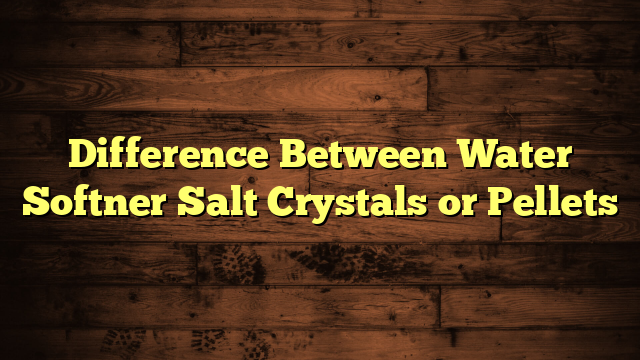Whats the Best Water Softner Salt to Use?
When you're considering what's the best water softener salt to use, you might find that the options vary considerably based on your specific needs and water quality. Evaporated salt, for instance, is known for its high purity and effectiveness, particularly in very hard water, while solar salt offers an eco-friendly and budget-conscious alternative. You might also want to explore potassium chloride if sodium intake is a concern for you. As you weigh these choices, it's essential to understand how your local water conditions can affect performance, which might lead you to some surprising conclusions.
Key Takeaways
- High-Purity Salt: Opt for solar or evaporated salt for superior performance and minimal impurities in water softening systems.
- Local Water Hardness: Assess your water hardness level to select the most suitable salt type for effective softening.
- Cost vs. Efficiency: Rock salt is economical but less effective; choose higher-quality salts for long-term savings and efficiency.
- Eco-Friendly Options: Solar salt is an environmentally friendly choice, produced through natural evaporation processes, minimizing waste.
- Follow Guidelines: Adhere to manufacturer recommendations for salt type and dosage to ensure optimal system performance and longevity.
Types of Water Softener Salt
When it comes to choosing the right water softener salt, you'll encounter several types, each with distinct characteristics. The most common types include solar salt, evaporated salt, and rock salt. Each type has a unique impact on water hardness and softener efficiency.
Solar salt, derived from evaporating seawater, contains fewer impurities and dissolves easily, making it ideal for maximizing softener efficiency.
Evaporated salt, produced through a more refined process, is highly pure and effective at combating water hardness, ensuring peak performance in your softening system.
On the other hand, rock salt, while often less expensive, may contain impurities that can hinder softener efficiency.
It's important to evaluate your specific water hardness levels when selecting the appropriate salt type. If your water is particularly hard, using high-purity solar or evaporated salt will yield the best results.
Ultimately, the right choice of water softener salt not only influences your system's effectiveness but also extends its lifespan.
Rock Salt Overview
Rock salt, primarily composed of sodium chloride, serves as a cost-effective option for water softening.
Its advantages include high purity levels and minimal additives, which can enhance the efficiency of your system.
To maximize its effectiveness, it's important to follow specific usage tips and guidelines tailored to your water softener.
Composition of Rock Salt
Composed mainly of sodium chloride, rock salt is a naturally occurring mineral that forms from the evaporation of seawater and saline lakes. Its rock salt composition is primarily sodium (Na) and chlorine (Cl), which together create the crystalline structure you see. However, the mineral content can vary depending on the source. You might find small quantities of other minerals like magnesium, calcium, and potassium, which can affect its overall properties.
In its raw form, rock salt appears as a crystalline solid, often with impurities that can range from clay to other salts. These impurities can influence the salt's color and solubility. Generally, higher purity rock salt has more desirable characteristics for water softening applications.
When selecting rock salt for your water softener, it's crucial to take into account the mineral content, as higher purity salts dissolve more efficiently and leave fewer residues in your system.
Understanding the rock salt composition guarantees that you make an informed choice, optimizing your water softening process while minimizing potential maintenance issues. Ultimately, the right choice of rock salt affects both the efficiency of your water softener and the quality of the water you use.
Advantages of Rock Salt
Understanding the benefits of rock salt can greatly enhance your water softening experience. This natural mineral option is not only cost-effective but also offers several advantages over other types of water softener salts.
| Advantage | Description | Mineral Benefits |
|---|---|---|
| Cost-Effective | Generally less expensive than other salts. | Saves money in the long run. |
| Natural Mineral | Contains essential minerals that can enhance water quality. | Improves taste and health benefits. |
| High Purity | Typically has fewer impurities than table salt. | Reduces scaling in plumbing systems. |
| Easy Availability | Widely available in most home improvement stores. | Convenient for regular replenishment. |
| Eco-Friendly | Less processed compared to synthetic options. | Better for the environment. |
Using rock salt in your water softening system can lead to improved efficiency and performance. Its mineral benefits not only soften water but can also contribute positively to your overall water quality. By choosing rock salt, you're opting for a solution that's both practical and beneficial, ensuring you maintain a high standard of water for your household needs.
Usage Tips and Guidelines
When selecting rock salt for your water softening system, it's essential to follow specific usage tips to maximize its effectiveness.
First, make sure you choose high-purity rock salt, as impurities can greatly impact water softener efficiency. Look for salt labeled as "solar salt" or "mined salt," which are typically more refined.
Next, adhere to the salt dosage recommendations provided by your water softener manufacturer. This guarantees that the system functions efficiently and prevents issues like salt bridging or mushing.
Regularly monitor your brine tank and refill it when necessary—keeping salt levels consistent is critical for maintaining performance.
You should also avoid mixing different types of salts in your brine tank. Each salt type has unique dissolution rates, which can disrupt the regeneration process.
Moreover, check for clumping or moisture in your rock salt, as these can hinder its effectiveness.
Finally, perform routine maintenance on your water softening system, including cleaning the brine tank, to enhance overall efficiency.
Solar Salt Benefits
Solar salt offers a cost-effective solution for water softening, making it an attractive choice for budget-conscious users.
Its high purity levels guarantee efficient performance, reducing the need for frequent replacements.
Moreover, opting for solar salt is an environmentally friendly choice, as it utilizes natural evaporation processes in its production.
Cost-Effective Option
Cost-effective solutions often lead homeowners to contemplate solar salt for their water softening needs. This type of salt is derived from evaporated seawater, making it an environmentally friendly and budget-friendly choice. By opting for solar salt, you can effectively reduce your overall water softening costs without sacrificing performance.
One of the key benefits of using solar salt is its affordability. It typically costs less than other types of water softener salts, such as rock salt or potassium chloride. This makes it a popular option for those looking for cost-effective options while still ensuring their water is treated properly.
The availability of solar salt in larger bags also translates to savings on packaging and transportation, further contributing to its cost efficiency. Additionally, solar salt is easy to find at local retailers and online, enhancing its appeal for homeowners.
Using solar salt can help extend the lifespan of your water softening system, as it minimizes the buildup of impurities that can occur with other salts. To summarize, solar salt is a practical and economical choice for anyone looking to optimize their water softening process while keeping expenses in check.
High Purity Levels
Choosing solar salt not only offers cost savings but also comes with the advantage of high purity levels. This type of salt is typically harvested through evaporation processes, which results in fewer impurities compared to other salt grades.
When you opt for high-purity solar salt, you're ensuring that your water softening system operates efficiently. High purity levels in solar salt translate to reduced residue and scaling within your water softener. This means less maintenance and longer-lasting equipment.
With fewer contaminants, you'll find that your system regenerates more effectively, ultimately improving the performance of your water softener.
Moreover, using high-purity solar salt can enhance the overall quality of the water you consume. As it contains minimal additives and impurities, you can be confident that the water will taste better and be more beneficial for your household needs.
Environmentally Friendly Choice
When it comes to selecting a water softener salt, opting for solar salt presents an environmentally friendly choice. Derived from evaporated seawater, solar salt is produced through sustainable practices that minimize energy consumption and reduce carbon footprint. This natural extraction method uses sunlight and wind, making it an eco-friendly alternative to mined salts.
Using solar salt not only benefits the environment but also promotes a more sustainable approach to water treatment. By choosing this type of salt, you support a product that requires less energy to produce, resulting in fewer greenhouse gas emissions.
Furthermore, solar salt often contains fewer impurities, which can enhance the efficiency of your water softening system and reduce the need for frequent maintenance.
Moreover, solar salt is generally free from additives commonly found in other salts, ensuring that it won't contribute harmful contaminants to your water system. This purity aligns with eco-friendly alternatives that prioritize health and environmental safety.
Potassium Chloride Explanation
Potassium chloride is a highly effective alternative to traditional sodium-based water softener salts. This option not only softens your water but also offers various potassium benefits. When using potassium chloride, you're not just addressing hard water; you're also ensuring your home's water supply is more health-conscious.
Here are some key points to evaluate about potassium chloride:
- Health Benefits: Potassium helps maintain healthy blood pressure levels, making it a safer choice for those on sodium-restricted diets.
- Environmental Impact: Using potassium chloride reduces the sodium that enters the local water supply, which can be beneficial for the environment.
- Potassium Sources: It's derived from natural mineral deposits, ensuring that you're using a more sustainable option.
- Efficiency: Potassium chloride is effective in softening water, often requiring less quantity than sodium-based salts for similar results.
Evaporated Salt Characteristics
Evaporated salt is a popular choice among water softener salts due to its high purity and effectiveness in softening hard water. It undergoes a meticulous evaporated salt production process that guarantees minimal impurities, which translates to peak performance in your water softening system.
Here's a concise overview of its key characteristics:
| Characteristic | Description |
|---|---|
| Purity | Typically 99.5% or higher |
| Solubility | Dissolves quickly in water |
| Efficiency | Highly effective in ion exchange |
| Environmental Impact | Minimal; less waste produced |
| Cost | Generally more expensive than rock salt |
The evaporated salt advantages are significant. Its high purity means fewer minerals remain in your system, reducing maintenance needs and prolonging the lifespan of your water softener. Furthermore, because it dissolves quickly, you won't face issues with clogs or buildup. When you choose evaporated salt, you're opting for a reliable solution that enhances your water quality while guaranteeing your softener operates at peak efficiency. This makes it an ideal choice for those looking to improve their home's water system.
Comparing Salt Options
Choosing the right salt for your water softener can greatly impact both performance and maintenance.
With various salt types available, understanding their differences can enhance your softener effectiveness. Here's a quick comparison of popular salt options:
1. Evaporated Salt: This type is highly pure, consisting of 99% sodium chloride. It's effective in reducing hard water minerals and tends to leave minimal residue.
2. Solar Salt: Harvested through solar evaporation, Solar Salt contains impurities that may affect softener performance.
While it's less expensive, you may need to clean your system more frequently.
3. Rock Salt: This is the least processed option and contains a higher percentage of impurities.
Although it's economical, it may reduce your softener's effectiveness and lead to more frequent maintenance.
4. Potassium Chloride: An alternative to sodium chloride, Potassium Chloride can soften water without increasing sodium levels.
However, it's generally more expensive and may require more frequent replenishment.
Factors to Consider
When selecting the right water softener salt, several factors can influence your decision. First, consider the water hardness in your area. This measurement, typically expressed in grains per gallon, indicates the level of calcium and magnesium in your water supply. Knowing your water hardness helps you choose the appropriate salt type to maximize softener efficiency.
Next, think about the type of salt you prefer. Options include rock salt, solar salt, and evaporated salt, each with varying purity levels and performance. Higher purity salts generally lead to better softener efficiency, as they produce less sludge and require less frequent maintenance.
Additionally, evaluate your budget. While higher-quality salts may cost more upfront, they can enhance your system's performance and longevity, ultimately saving you money on repairs and replacements.
Lastly, consider any specific requirements your water softener may have. Some models are designed to work best with particular salt types. Always refer to the manufacturer's recommendations to guarantee compatibility and maintain peak softening performance.
Maintenance Tips for Water Softeners
To keep your water softener running efficiently and effectively, regular maintenance is essential. Neglecting water softener upkeep can lead to reduced performance and increased costs. Here are some tips to guarantee your system stays in top shape:
- Check Salt Levels: Regularly inspect the brine tank and maintain adequate salt levels. A full tank guarantees peak regeneration cycles.
- Use Quality Salt: Invest in high-purity salt to minimize impurities that can clog your system. Look for products specifically designed for water softeners.
- Clean the Brine Tank: At least once a year, clean the brine tank to remove any buildup or residue. This helps prevent clogs and maintains performance.
- Monitor System Settings: Periodically review and adjust your system settings according to water usage and hardness levels. This guarantees your water softener operates efficiently.
Frequently Asked Questions
Can I Use Table Salt in My Water Softener?
You shouldn't use table salt in your water softener; it's not compatible and can cause damage. Instead, consider more suitable table salt alternatives designed specifically for water softeners to guarantee maximum performance and longevity.
How Often Should I Refill Salt in My Water Softener?
You might think salt refills are a hassle, but regular salt replenishment frequency keeps your water softener running efficiently. Check levels monthly, and consider these salt usage tips to maintain peak performance without interruption.
Is Water Softener Salt Safe for Drinking Water?
Water softener salt isn't typically harmful for drinking water, but it can affect water quality. If you have health concerns, consider using a reverse osmosis system to remove excess sodium from your drinking supply.
What Is the Shelf Life of Water Softener Salt?
Water softener salt, primarily sodium chloride or potassium chloride, typically has a shelf life of about five years. Store it in a cool, dry place to maintain its effectiveness and prevent clumping or moisture absorption.
Can Water Softener Salt Damage My Plumbing?
Water softener salt can potentially harm your plumbing if used improperly. Regular plumbing maintenance and choosing the right salt types are essential to avoid corrosion and buildup, ensuring your system functions efficiently and lasts longer.
Conclusion
Choosing the best water softener salt is like selecting the right tool for a job; it's vital for peak performance. Whether you opt for high-purity evaporated salt, cost-effective solar salt, or potassium chloride for dietary needs, your choice should align with your specific water hardness and budget. Remember, maintaining your water softener is important for efficiency, so regularly check salt levels and clean the system as needed to guarantee it runs smoothly.







